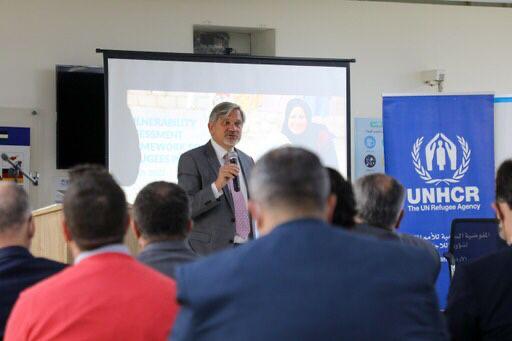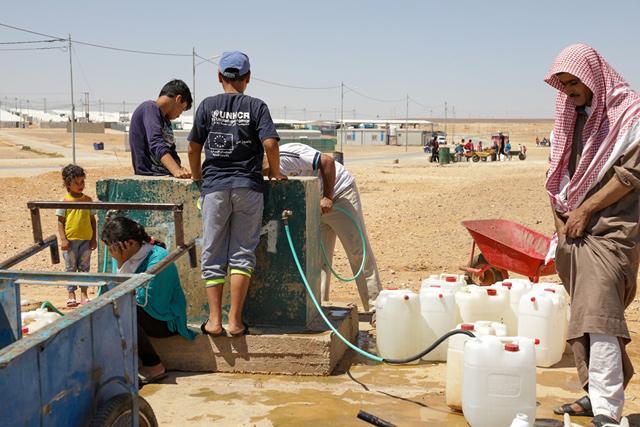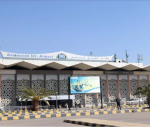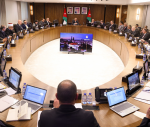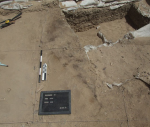You are here
‘80% of urban Syrian refugee families worry about paying rent’
By Dana Al Emam - Jun 30,2015 - Last updated at Jun 30,2015
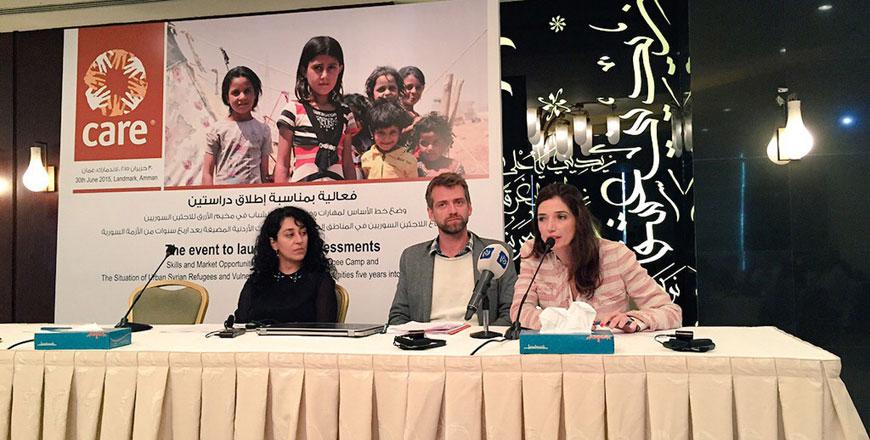
Officials from CARE and Silatech hold a press conference in Amman on Tuesday to launch two reports on Syrian refugees in Jordan (Petra photo)
AMMAN — Around 80 per cent of Syrian refugee families living among host communities across the Kingdom said their main concern is paying rent, according to a CARE International report issued Tuesday.
Securing food needs, access to health services and cash were also among the major challenges facing some 630,000 registered Syrian refugees in Jordan, according to the survey based on interviews with 1,300 Syrians living in urban areas.
Half of the interviewed Syrian families said their overall situation has deteriorated over the last year, with eight out of 10 families worried about housing and six out of 10 lacking money to buy enough food, a ratio that has increased since the World Food Programme reduced support.
Titled “Five Years into Exile: The challenges faced by Syrian refugees outside camps in Jordan and how they and their host communities are coping”, the report highlights reduced levels of assistance and access to services, lack of sustainable livelihoods and complicated registration procedures as factors deepening their hardships.
“We fear that without scaling up international assistance, the spiral of deepening poverty will accelerate with lasting impact on both refugees and local communities,” CARE Jordan Country Director Salam Kanaan said.
Furthermore, the lack of steady income and formal employment remains a fundamental problem for Syrian refugees, with most families getting into debt or adopting “harmful” coping mechanisms such as child labour and keeping children home from school to save expenses.
“Over one-third of school-age children and adolescents surveyed continue to be absent from school,” the report states, noting that the main barrier to attendance is financial with 10 per cent of families relying on child labour as a source of income.
Living situations have affected the psychosocial well-being of refugees, with those surveyed saying they experience “high” levels of stress, due to cramped housing conditions, uncertainty about the future and concern about family and friends in Syria.
Burdens for women seem larger, with around 30 per cent of the surveyed families headed by women, who find themselves responsible for securing income.
The report also cites an increase in gender-based violence cases and says that the elderly are no longer respected and central in community life but rather seen as a burden to the families due to their limited contribution to income.
An increasing number of refugees are unable to enjoy legal protection or access to services and assistance, especially with the policies regarding registration with the government and the UNHCR introduced in mid-2014, the report said.
Commenting on the report, as well as another on the Azraq Refugee Camp also issued Tuesday, UNHCR Representative to Jordan Andrew Harper commended the “excellent evidence-based” discussions that the two reports propose.
He cited the significance of changing the approach in responding to the refugee issue from aid delivery to utilising their skills and enhancing their economic conditions and that of Jordan in a manner that preserves their dignity.
Harper said the UNHCR is working with the Labour Ministry to provide Syrian refugees with work permits, noting that the number currently stands at 2,000 and is expected to increase.
He concluded by highlighting the need for scientific, evidence-based studies in addressing the international community when discussing the situation of refugees as it provides further credibility and encourages donors to provide assistance.
Related Articles
AMMAN — Sixty-four per cent of refugees in Jordan survive on less than JD3 a day, according to a joint vulnerability assessment of refugees
AMMAN — The UNHCR currently has no plans to reduce the amount of cash assistance it provides to Syrian refugees in Jordan despite a decrease
Jordan is one of the countries most affected by the Syrian crisis, UNHCR Representative Andrew Harper said Tuesday.


